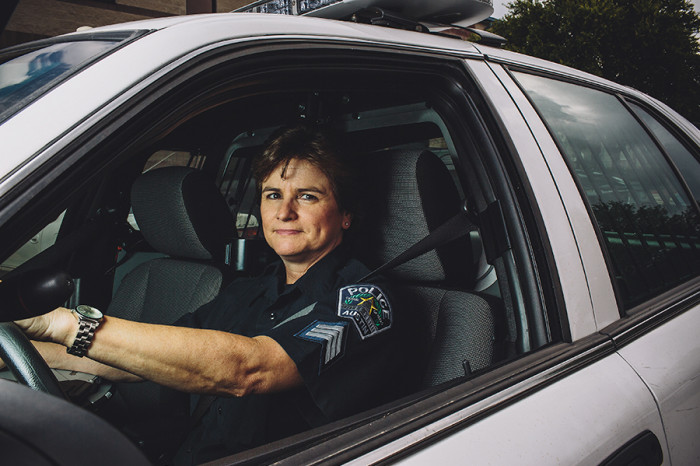Sergeant Cara Boyd, a 15-year veteran of the Austin police Department, channels inner strength. From coming out to her conservative parents, to jumping headfirst into a new career in law enforcement at age 32, to reconnecting with God, to becoming a stepmom, she has shown tenacity and patience in the face of life’s obstacles.
As a kid, Boyd was the classic tomboy. She was athletic and preferred to play with her younger brother than to hang out with her older sisters. It was divine intervention (three angels, to be exact) that inspired her future in law enforcement. When Charlie’s Angels first appeared on TV in 1976, Boyd was fascinated by the fact that there could be women police officers. She idolized Kate Jackson (aka “Sabrina”) because “she was the tough one out of the three.” At the ripe age of 10, she started dreaming of one day being a crime-fighting police officer just like the women she saw on TV.
Growing up in San Angelo, TX, Boyd always felt out of place in a town where everyone wore Wranglers, boots and cowboy hats. She also felt different from all the girls in her class. In high school, she dated guys but thought of them as “buddies” and never felt a “true emotional attachment” to them. On the other hand, she had crushes on girls that she never acted upon. Boyd was raised in a strong Christian household and knew that what she was feeling went against what she was taught. “I tried so hard to be straight. But it was as unnatural as it would be for a straight person trying to be gay,” she said.
 It wasn’t until she transferred to Sam Houston State University in 1985 that Boyd figured out what the word “gay” even meant and found others who were more open-minded. Moving from her small, conservative hometown to a more progressive town near Houston was liberating. She found gay friends, started dating women and was able to be herself. At the time, she was pursuing a degree in criminal justice in hopes of becoming an FBI agent or detective but discovered that she actually was disenchanted with her major. The combination of a newfound freedom and her boredom with studying criminal justice resulted in a disregard for her studies. She just wanted to be free and enjoy life.
It wasn’t until she transferred to Sam Houston State University in 1985 that Boyd figured out what the word “gay” even meant and found others who were more open-minded. Moving from her small, conservative hometown to a more progressive town near Houston was liberating. She found gay friends, started dating women and was able to be herself. At the time, she was pursuing a degree in criminal justice in hopes of becoming an FBI agent or detective but discovered that she actually was disenchanted with her major. The combination of a newfound freedom and her boredom with studying criminal justice resulted in a disregard for her studies. She just wanted to be free and enjoy life.
Influenced by her time at Sam Houston State’s radio station, Boyd left the college and enrolled in classes at a radio and television school in Houston. In 1988 she moved to Austin and was hired as an overnight DJ under the name Dusty Street at a top-40 radio station. She would go on to work for one other radio station as a morning producer before leaving the low-paying profession.
While in her early 20s, Boyd experienced her first heartbreak, which left her devastated. Her breakup did not go unnoticed by her family, and her sister eventually told their mom about Boyd’s relationship. Her mother attributed her daughter’s emotional distress to being gay and not to being hurt by the breakup. Her mother regularly told her to “get right with God” and to change [her] lifestyle. “My mom really thought my soul was in jeopardy. She was doing it out of love, but she didn’t realize how much it was hurting me.”
Amidst this emotional turmoil, Boyd became a bank teller and eventually moved up from branch manager to operations manager. It was during this time, and throughout her 20s, that she felt “lost.” She was unmotivated to finish her degree. “I felt I couldn’t move forward unless I was not gay. I was unable to function as a thriving adult in the community, mostly because I wanted to please my mother.”
Boyd was caught in life’s limbo, which left her dream of becoming a cop on the back burner. But at her 29th birthday party in 1994, she met a woman—a police officer—who reignited her ambition to fulfill her lifelong goal.
The two started dating and remained together for 11 years. In the first year of their relationship, Boyd was immersed in police culture, which only fueled her desire to aid the vulnerable in society. “I thought if she can do it, I could do it. I wanted to be like her.”
Boyd’s determination was endless. She failed twice before she was accepted into the academy in 1998 on her third try at age 32. That was three years of intense training and dedication while still maintaining a job at the bank as a training specialist. “Each time I failed, I was able to put more time in between my past and my present. I was able to grow and mature,” she said. Not only did she finally get accepted into APD, Boyd also completed her bachelor’s degree in social psychology at Park University. She walked a little taller after finally accomplishing her goals.
Because Boyd was one of the oldest in her cadet class, the physical aspect of her training was challenging. She was not as fit as her 21-year-old male counterparts. But as a 32-year-old woman, she had life experience that she used to relate to people on the street and to create a different approach to situations.
As a rookie, she was assigned to patrol the Rundberg area, a segment in Northeast Austin that was plagued with chronic crime, including prostitution and drug dealing. Boyd was eager to assist the area’s residents and gain their trust and respect. She was disappointed to find her efforts went largely unwelcome because many people in the area were wary of cops.
Regardless of the community’s indifference, the victim services unit nominated her as “Street Officer of the Year” for Northeast Austin. Boyd was honored with the award for her compassion and engagement with victims of crimes.
The realities of everyday police work was a “rude awakening” for Boyd. “We see the worst side of people. We see them in crisis mode. It’s rare to see people when they’re happy,” she said.
After a little more than two years on patrol, Boyd transferred to a specialized unit called Street Response. As the only female in her unit at the time, she posed as “bait” for men soliciting prostitutes in locations known for this activity. Her participation in prostitution stings and drug busts demanded a lot. She participated in the stings about 10 times. “After a while, it’s very stressful, because you’re completely vulnerable,” she explained. “You do everything against what you’re trained to do.”
Following 11 years in the force working in various departments, including child abuse and internal affairs, Boyd was promoted to patrol sergeant in 2009. Two years later, she was transferred to supervise the district representatives in North Austin, later becoming a sergeant responsible for a group of detectives investigating cases.
Lieutenant Jessie Brown supervised Boyd when she was a patrol sergeant and a district representative sergeant. “As a person, she’s completely wonderful. As an officer, she’s dedicated, she pays attention to detail and doesn’t settle for good enough. She always wants to improve,” he said.
The constant misery and tragedy that police officers face daily are extremely wearing. Boyd has witnessed everything from family disturbances to suicides; she’s been in harsh fistfights with drug dealers; she’s held dying babies on two different calls; she’s been on the scene of the aftermath of someone trying to cross I-35 on foot. A side effect of the job is a constant state of alert, even during time off.
“What police officers do for years, day in, day out, every single day, is see the worst in the people; see death, see pain,” Boyd said. “After a while, you’re this walking wounded. You’re just numb to things. A lot of officers suffer from PTSD and they don’t even know it.”
The ways that her fellow officers deal with the stress vary from working out to having a drink. For Boyd, she makes sure she talks to someone about it instead of keeping it to herself because it can “eat you alive.” She has also tried to maintain her faith in humanity, remembering that there are still good people in the world. What guides her in these challenges is her faith in God. “His presence in my life has kept me sane, especially in this line of work. I don’t think I could’ve done it without knowing He exists and that He
loves me.”
It was this epiphany that took Boyd several years to reach. In the past, her convictions pushed her away from having a relationship with God. As she got older, she learned how to seek God on her own.
“I ran away from God for a long time because I didn’t think it was possible to have a relationship with Him and be gay. I felt like such a bad person. I realize now that He loves me.”
Boyd has also reconciled her relationship with her mother, with whom she has a close relationship today. “She has come a long way and has accepted me and knows God loves all of us, no matter what,” she said. Boyd’s mother has been able to put the past behind her and is happy about her daughter’s engagement to her partner, Lisa.

The couple met six years ago through mutual friends and started dating. Lisa recently proposed to Boyd while they were on a ski trip with Boyd’s family on the slopes of Durango. They plan to have a commitment ceremony in October.
An upstate New York native, Lisa came out later in life, after she was married for years and had three children: Sarah, Steven and Audrey. She was attracted to Boyd’s compassion and strength. When the two started dating, her oldest child was heading to college and her youngest was 10 years old. Lisa noted that it certainly was not easy to be a stepparent when the children were “half-grown.”
“She’s definitely patient. I don’t know how many people go into a relationship where three other people are involved and end up doing so well at it,” said Lisa, an in-home care manager for Family Eldercare.
Boyd observed that it was a challenge to be an authoritative parent and to figure out her boundaries as a stepparent. “We worked through our issues and I know the kids love me,” she said. “They called me on Mother’s Day and Audrey got me a Mother’s Day card. That was my first Mother’s Day card ever. I think they’ve gotten comfortable with their ‘stepmomster.’”
From fighting crime on the streets to navigating some difficult life challenges, there’s nothing Boyd can’t handle. Well, maybe not bugs. Lisa laughed, saying, “I’m the one who has to kill those things if they’re in the house! That’s all right because I get to be the hero sometimes.”




































